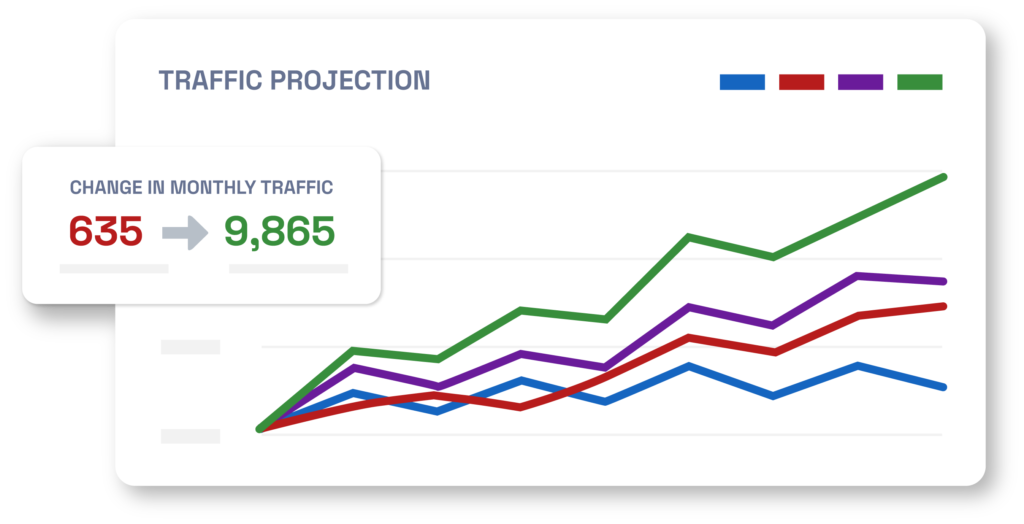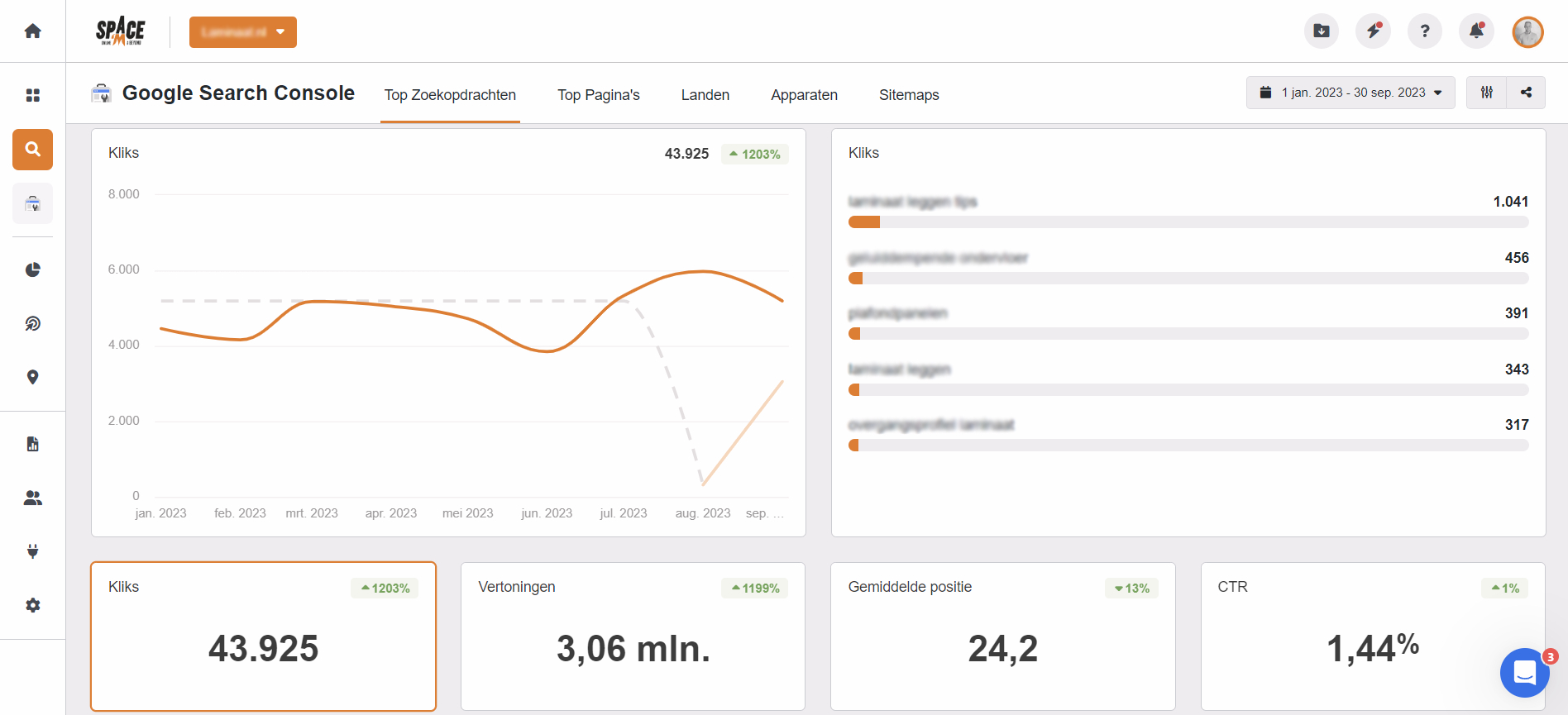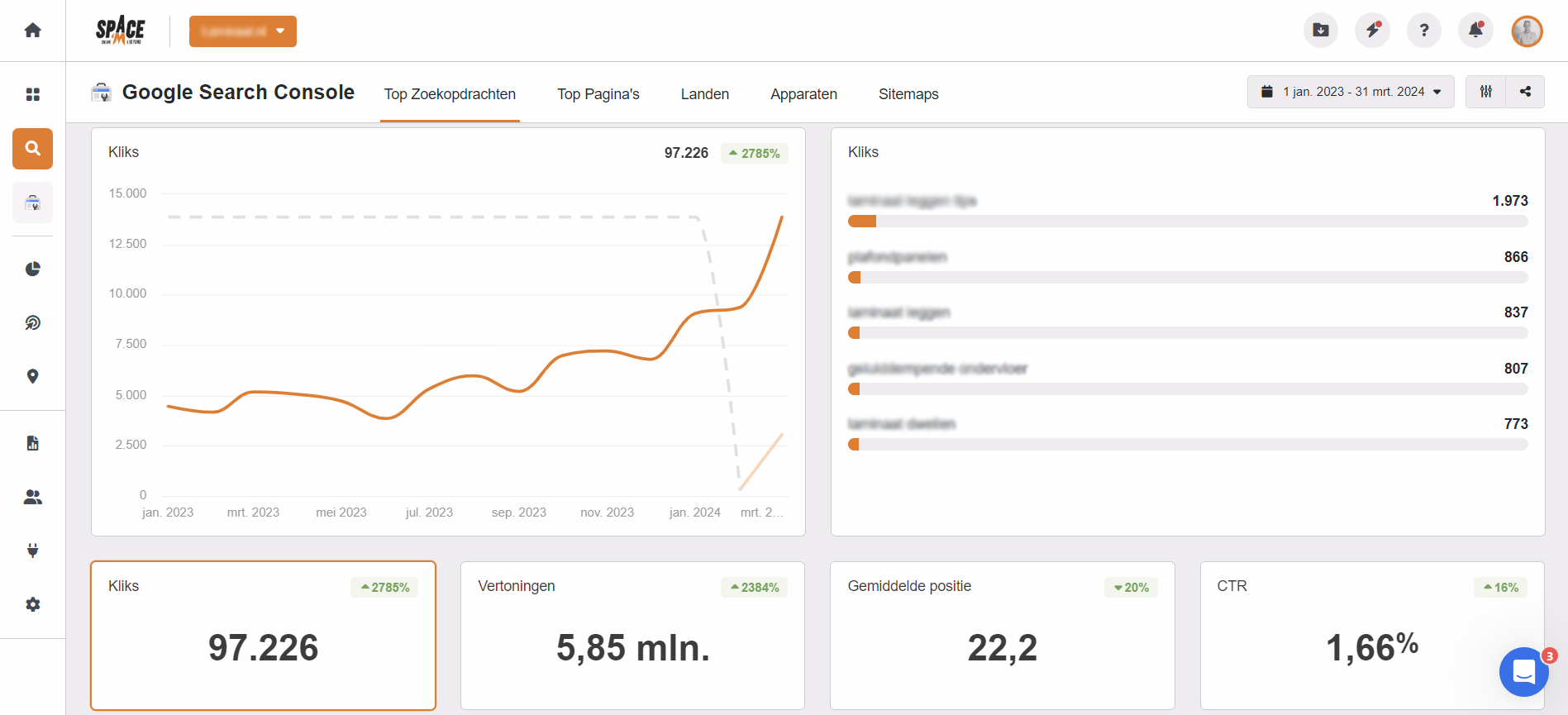Struggling to attract online leads for your real estate business? SEO real estate techniques can significantly boost your website’s visibility on search engines, ensuring more potential clients find you. In this article, discover actionable tips to enhance your real estate website’s SEO and drive more traffic.
Key Takeaways
Investing in a comprehensive real estate SEO strategy, which includes keyword research, on-page optimization, and building backlinks, is crucial for attracting potential clients and improving online visibility.
- Local SEO is essential for real estate agents, particularly with 93% of Google searches being local in nature. Optimization of Google Business Profiles, local citations, and leveraging online reviews can significantly enhance visibility in local search results.
- Monitoring and analyzing SEO performance using tools like Google Analytics and Google Search Console is imperative for making data-driven decisions, improving website performance, and maintaining a competitive edge in the real estate market.
Understanding Real Estate SEO
Real estate SEO focuses on improving the visibility and ranking of real estate websites on search engines through various techniques such as real estate SEO tips, including:
- Keyword research
- Content creation
- On-page optimization
- Building backlinks
The ultimate goal of search engine optimization is to attract potential clients by ranking higher in organic search results, thereby generating quality leads and driving traffic to the website. This ongoing effort involves continuously monitoring and adjusting strategies to achieve the best results.
In the competitive real estate industry, having a strong online presence is crucial for success. By investing in a comprehensive real estate SEO strategy, real estate agents can ensure their websites are easily discoverable by potential clients. This not only increases traffic and credibility but also positions them as experts in their field, making them the go-to real estate agent in their area.
What is Real Estate SEO?
Real estate SEO involves optimizing online content, including websites and social media platforms, to attract organic traffic and improve search engine rankings. This process includes optimizing both on-page signals, such as content and metadata, and off-page signals, like backlinks. The primary aim is to make the website more visible to search engines, which in turn helps in reaching a broader audience and attracting potential clients.
Keyword research plays a pivotal role in real estate SEO. By identifying and analyzing the terms and phrases potential clients use when searching for real estate, agents can create targeted content that addresses their needs. Additionally, building high-quality backlinks from reputable websites can enhance the website’s authority and drive more organic traffic.
Why is SEO Important for Real Estate Agents?
SEO is essential for real estate agents because it:
- Generates organic traffic, attracting potential clients and ensuring online visibility
- Is crucial for a robust online presence, with 99% of homebuyers using the internet during their home-buying process
- Helps buyers find homes online, making it a crucial element in the real estate marketing strategy.
A strong SEO strategy can help real estate agents dominate local search results, generate leads, and maintain a competitive edge in the market. By ranking in the top positions on search engine results pages, real estate websites can attract a high volume of potential leads. This not only increases traffic but also enhances the credibility and trustworthiness of the real estate business.
Moreover, SEO provides the following benefits for real estate agents:
- Consistent and predictable lead flow
- Increased visibility and brand awareness
- Higher search engine rankings
- More targeted and qualified leads
- Improved user experience on their websites
- Increased credibility and trust from potential clients
By continuously optimizing their websites and content, real estate professionals can ensure a steady stream of qualified leads, ultimately boosting their revenue and success in the industry.
Essential Components of Real Estate SEO
To build a successful real estate SEO strategy, it’s essential to focus on key components such as keyword research, on-page optimization, and off-page strategies. Each of these elements plays a crucial role in improving search engine rankings and attracting the target audience. By understanding and implementing these components, real estate agents can create a comprehensive SEO plan that drives results and boosts online visibility.
In the following subsections, we’ll dive deeper into each of these components, offering practical tips and insights on how to effectively incorporate them into your real estate SEO strategy. From identifying the right keywords to optimizing your website’s content and building high-quality backlinks, you’ll gain a thorough understanding of the essential elements needed for a successful SEO campaign.
Keyword Research for Real Estate
Keyword research is the foundation of any successful SEO strategy. By identifying and analyzing relevant real estate keywords, agents can improve their search engine rankings and attract their target audience. Seed keywords, which are broad search terms reflecting core topics related to the business, serve as the starting point for finding more specific long-tail keywords. These long-tail keywords, being less competitive, offer a higher chance of ranking well in search results.
There are various tools available to assist in keyword research, including Google’s Keyword Planner, which provides data on search volume, ranking difficulty, and competition. By focusing on 3-5 high-value keywords and incorporating variations and specific phrases, such as “your city homes for sale,” agents can create targeted content that meets the needs of potential buyers.
On-Page SEO Techniques
On-page SEO techniques are crucial for higher search engine rankings and increased click-through rates. Properly optimizing metadata, such as title tags and meta descriptions, can significantly impact how search engines and users perceive the website. Ensuring that these elements are up to date and accurately reflect the content of the page is essential for maximizing SEO efforts.
In addition to metadata, the organization of web pages using header tags and internal links is vital for on-page SEO. Good quality content that naturally incorporates relevant keywords can provide value to visitors and improve search engine rankings. By creating separate pages or content for each target keyword and including the keyword within the title, meta description, and URL slug, agents can enhance their website’s visibility and relevance.
Off-Page SEO Strategies
Off-page SEO strategies, such as building high-quality backlinks, are essential for boosting website authority, credibility, and search engine rankings. When reputable websites link to a real estate website, it signals to search engines that the site is a credible source of information, leading to higher rankings. Local backlinks from business directories or local newspapers can also validate local authority and drive relevant leads.
Engaging in digital PR and collaborating with industry professionals, such as mortgage brokers and home inspectors, can provide fresh perspectives and enhance credibility. Additionally, leveraging client reviews and responding promptly and professionally to feedback can signal to search engines that the business is active and reputable.
Local SEO for Real Estate
Local SEO targets location-based searches to help real estate agents connect with nearby customers. With 93% of Google searches coming from people looking to interact with a local business, optimizing for local SEO is crucial for real estate professionals. By focusing on local SEO elements, agents can dominate local search results and attract clients within specific geographic areas.
In this section, we’ll explore how to optimize your Google Business Profile, build local citations, and leverage online reviews to enhance local SEO efforts. By implementing these strategies, real estate agents can improve their online visibility and establish themselves as trusted experts in their local markets.
Optimizing Your Google Business Profile
A well-optimized Google Business Profile can significantly improve local search visibility and help businesses appear reputable and trustworthy. By claiming and optimizing their profiles, real estate agents can ensure that their business information is accurate and compelling. This includes filling out all aspects of the profile, such as business services, descriptions, and service areas.
Including images of the office, team members, awards, and properties in the Google Business Profile can help build trust and provide potential clients with insight into the business. Consistency in business details across all websites is crucial for legitimacy and visibility on Google.
Building Local Citations
Local citations refer to directory submissions listing a business’s Name, Address, and Phone number (NAPs). Ensuring accurate and consistent NAP information across all citation accounts, such as Facebook and Yelp, is critical for effective local SEO. Consistency helps Google verify business information and avoid confusing search engines.
Engaging with local directories and maintaining consistent NAP citations can increase visibility and ensure the accuracy of business information. This, in turn, helps real estate agents connect with potential clients in their local markets and improve their online presence.
Leveraging Online Reviews
Online reviews play a significant role in establishing a business’s trustworthiness, visibility, and reputation. Positive reviews on Google can result in higher rankings and attract more users to the website. Encouraging satisfied clients to leave honest ratings on their Google Business Profile and other review sites can enhance credibility and legitimacy.
Handling negative reviews properly is also crucial for maintaining a positive brand image. By replying promptly and professionally to negative feedback, real estate agents can show that they care about their customers’ experiences and are committed to resolving any issues.
Creating High-Value Content
Creating high-value content is essential for real estate SEO, as it positions the website as an authority and provides value to the audience. By focusing on local topics and offering practical advice on home buying, selling, and real estate investment, agents can create engaging content that resonates with their target audience. Regularly updating a blog can also help improve page rankings on search engine results pages (SERPs).
In the following subsections, we’ll discuss:
- How to develop a content strategy
- The benefits of blogging for real estate
- The importance of utilizing visual content to enhance user engagement and SEO rankings.
Developing a Content Strategy
Developing a content strategy is crucial for creating engaging and valuable content that meets the needs of your target audience. Establishing content hubs, which are groups of closely related articles centered around core topics, can help organize and structure your content effectively. Utilizing tools like Surfer can provide a list of topics, article ideas, and recommendations to build comprehensive content hubs.
Ensuring that your content meets EEAT (Expertise, Authoritativeness, and Trustworthiness) standards is vital for better Google ranking. Incorporating the latest news, trends, and developments in the real estate industry can keep your content current and relevant. Creating neighborhood guides with detailed information about schools, amenities, and attractions can make your blog posts more relatable and engaging.
Blogging for Real Estate
Maintaining a blog on your real estate website can attract and retain visitors by providing valuable and informative content. Regularly updated blogs can improve page rankings on SERPs and increase online visibility.
Using storytelling techniques can help readers connect with your content on a personal level. Some effective storytelling techniques for real estate blogs include:
- Sharing client success stories
- Providing behind-the-scenes looks at your business
- Highlighting unique properties and their stories
- Sharing personal experiences and lessons learned
By incorporating these storytelling techniques into your real estate blog, you can create engaging and compelling content that resonates with your audience.
Additionally, blogs can cover a wide range of topics in the real estate industry, including:
- Market trends
- Property listings
- Home buying tips
- Neighborhood guides
This variety not only keeps your audience engaged but also helps establish your website as a go-to source of knowledge in the real estate industry.
Utilizing Visual Content
Incorporating visual content can significantly boost SEO rankings and enhance user engagement. Some examples of visual content that can be used include:
- Videos
- Podcasts
- Graphics
- High-quality images
- Virtual tours
- Video content
Real estate, in particular, relies heavily on visualization, making it essential to include these types of visual content to showcase real estate listings effectively.
Video SEO is an important aspect of optimizing your visual content for search engines. Here are some strategies to improve the visibility and ranking of your video content:
- Optimize video titles and descriptions with target keywords to improve search engine rankings.
- Create attractive thumbnails that entice viewers to click on your videos.
- Encourage happy home buyers to share their stories through videos and images to enhance trustworthiness and provide a more personal touch to your content.
By implementing these strategies, you can maximize the impact of your video content and attract more viewers.
Technical SEO for Real Estate Websites
Technical SEO forms the foundation for effective SEO and is vital for real estate websites. This involves optimizing all the behind-the-scenes elements that search engines crawl and index, such as site speed, mobile compatibility, and structured data. Addressing technical SEO issues ensures that search engines can effectively crawl and index your content, ultimately improving search engine rankings.
In the following subsections, we’ll discuss:
- The importance of improving website speed
- Ensuring mobile-friendliness
- Implementing structured data to enhance your real estate website’s technical SEO.
Improving Website Speed
Fast load speeds are crucial for SEO, as slow websites can lead to lower search engine rankings and decreased user engagement. Monitoring technical elements like broken links, accurate sitemaps, and page load speed through tools like Google Search Console is essential for maintaining SEO value.
To combat slow website speed, consider using services like Shortpixel to compress images and tools like Semrush’s Site Audit tool to identify and fix site issues. Ensuring that your website loads quickly can improve user experience and increase the likelihood of visitors staying on your site and engaging with your content.
Ensuring Mobile-Friendliness
Mobile responsiveness is essential for real estate websites, as over 60% of Google searches are done on mobile devices. Google’s mobile-first indexing means that the search engine primarily crawls the mobile version of sites, making it crucial to optimize for mobile.
Neglecting mobile optimization can significantly impact your site’s performance and search engine rankings. Ensuring fast load times, a clean user experience, and adherence to key page experience signals, such as Core Web Vitals and HTTPS security, can enhance your website’s mobile-friendliness and overall SEO efforts.
Implementing Structured Data
Using structured data, such as RealEstateListing schema, helps search engines better understand your website content and improve search engine rankings. Structured data provides clear property details, like location, price, and publication date, making it easier for search engines to index and display relevant information.
Implementing schema markup on your real estate website can enhance the visibility of your listings in search results and provide potential clients with valuable information at a glance. This not only improves your website’s SEO but also enhances the user experience by presenting structured and organized data.
Monitoring and Analyzing SEO Performance
Monitoring and analyzing SEO performance is crucial for making data-driven decisions and refining your SEO strategy. Tools like Google Analytics and Google Search Console provide valuable insights into user behavior, website traffic, and search performance. By tracking key metrics, such as Google rankings, impressions, traffic, click-through rate (CTR), and conversion rate, you can measure the success of your SEO efforts and make necessary adjustments.
In the following subsections, we’ll explore how to set up Google Analytics, use Google Search Console, and identify key SEO metrics to track. These tools and metrics will help you evaluate your SEO performance and ensure that your strategies are aligned with your goals.
Setting Up Google Analytics
Google Analytics allows you to monitor user behavior and gather data on how clients interact with your real estate website. By setting up Google Analytics, you can track metrics such as page views, session duration, and bounce rate, providing insights into how visitors engage with your content.
With this data, you can identify areas for improvement and optimize your website to enhance user experience and increase engagement. Setting clear goals and KPIs for your SEO program is essential for measuring the success of your efforts and making informed decisions.
Using Google Search Console
Google Search Console is a valuable tool for monitoring your website’s search performance and identifying technical issues, especially when optimizing for Google Ads. It allows you to:
- Track various metrics such as clicks from search engines, impressions, average position, and queries used to find your website
- Gain valuable insights into your website’s performance on Google search
- Understand how your site is performing in search results
- Identify opportunities for improvement
Google Search Console can help you:
- Identify and fix issues that affect crawling and indexing, ensuring that your website content is searchable
- Regularly monitor your site’s performance
- Stay on top of changes and make strategic adjustments to optimize your real estate website for better rankings and more organic traffic.
Key SEO Metrics to Track
Tracking key SEO metrics is vital for evaluating the performance of your SEO efforts and making data-driven decisions. Important metrics to track include:
- Google rankings
- Impressions
- Traffic
- Click-through rate (CTR)
- Conversion rate
These metrics provide insights into how well your website is performing in search results and how users are engaging with your content.
Additionally, tracking metrics such as time on page, pages viewed per user session, and bounce rate can help you understand user engagement and website performance. Utilizing web analytics tools to monitor these metrics can help you set specific goals related to user actions on your site and refine your SEO strategy to achieve better results.
Avoiding Common SEO Mistakes
Avoiding common SEO mistakes is crucial for maintaining a strong online presence and ensuring the success of your SEO efforts. Some of the most common mistakes include keyword stuffing, using duplicate content, and ignoring technical SEO. By understanding and addressing these issues, you can improve your website’s search engine rankings and provide a better user experience.
In the following subsections, we’ll discuss the negative impact of keyword stuffing, the importance of avoiding duplicate content, and the significance of addressing technical SEO issues. By avoiding these common pitfalls, you can ensure that your SEO strategy is effective and aligned with best practices.
Keyword Stuffing
Keyword stuffing is an outdated practice that involves overloading a webpage with keywords in an attempt to manipulate search engine rankings. This practice can result in lower search engine rankings, as search engines now penalize keyword stuffing. Instead of keyword stuffing, it is important to focus on natural keyword integration to improve SEO and user experience.
By conducting thorough keyword research and strategically incorporating relevant keywords into your content, you can enhance your website’s visibility and relevance without resorting to keyword stuffing. This approach not only improves search engine rankings but also provides a better experience for your visitors.
Duplicate Content
Duplicate content can confuse search engines about which pages to rank, potentially lowering your website’s visibility. Ensuring that your content is unique and original is essential for maintaining a strong online presence.
By avoiding duplicate content and creating high-quality, valuable content, you can improve your website’s search engine rankings and attract more organic traffic.
Ignoring Technical SEO
Ignoring technical SEO can severely impact your website’s performance and search engine rankings. Fixing crawling and indexing issues is crucial, as content needs to be accessible to search engine bots to have SEO value. Conducting a full technical audit, including checking response codes, website structure, and security issues, can help identify and address technical SEO problems.
By addressing technical SEO issues and ensuring that your website is optimized for search engines, you can:
- Improve your search engine rankings
- Provide a better user experience
- Increase organic traffic
- Achieve higher conversion rates.
In what other industries does Space’M Online SEO?
Space’M Online extends its SEO expertise across a diverse range of industries beyond finance, legal, insurance, and e-commerce. Our team is adept at crafting tailored SEO strategies for sectors such as healthcare, education, real estate, and technology.
By understanding the unique challenges and opportunities within each industry, we help businesses enhance their online presence, drive targeted traffic, and achieve sustainable growth. Whether you’re a local business or an international enterprise.
Space’M Online is committed to delivering results that align with your specific industry needs and goals, take a look at the following industry page to get more information:
Frequently Asked Questions
We recognize that you might have inquiries about our SEO services for real estate companies and our modus operandi. Here are some frequently asked questions to help clarify our approach and the benefits of partnering with Space’M Online:
What is real estate SEO?
Real estate SEO involves optimizing online content to attract organic traffic and improve search engine rankings. It includes websites and social media platforms.
Why is SEO important for real estate agents?
SEO is crucial for real estate agents as it helps generate leads, attract potential clients, and maintain a competitive edge in the market, providing consistent and predictable lead flow and income.
What are the essential components of real estate SEO?
To improve your real estate SEO, focus on keyword research, on-page optimization, off-page strategies, and local SEO. These components will help boost your online visibility and attract more potential clients.
How can I optimize my Google Business Profile for local SEO?
To optimize your Google Business Profile for local SEO, claim and optimize your profile by filling out all aspects and ensuring consistency in business details across all websites. Include images and business services to improve visibility and attract potential customers.
What are common SEO mistakes to avoid?
Avoid keyword stuffing, duplicate content, and ignoring technical SEO, as these mistakes can harm your website’s search engine rankings and user experience.




















